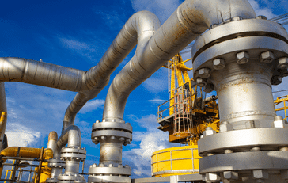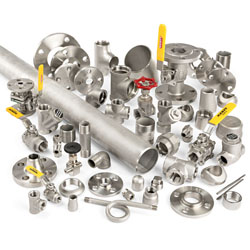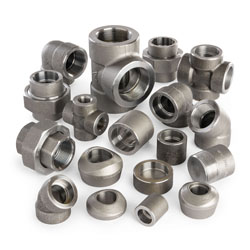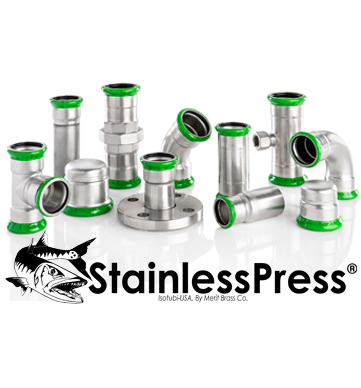As a manufacturer and master distributor, quality through product consistency, durability and longevity is at the core of Merit’s commitment to our customers. High quality products are also required in the oil and gas industry for environmental safety reasons given the substances that are drilled, transported, and refined. The two most common metals used in the oil and gas industry are stainless steel and forged carbon steel.

As part of the energy sector and largest global industry, the oil and gas industry is comprised of different processes that gather, drill, transport, process, refine, and distribute the finished products to consumers and end users for everyday use. Crude Oil is made up of complex hydrocarbons and comes in many forms making its viscosity and volatility levels vary.
Natural Gas is made up of different hydrocarbons such as ethane, propane, butane, and pentane, however, roughly 80% of gas is made up of methane making it easier to refine for commercial use. The oil and gas industry supports millions of American jobs, provides lower energy costs, and ensures energy safety.
The oil and gas industry is split into three main segments: upstream, midstream, and downstream.
Upstream is the exploration (underwater and underground) and production of crude oil and natural gas. The exploration process includes gathering information from geologic surveys to help find areas where minerals can be found such as underground natural gas or crude oil fields. The production process includes drilling into wells to recover oil and gas and bringing it to the surface.
Midstream is the transportation, storage & processing of oil and natural gas. The transportation process includes transporting the oil and gas, found in the upstream stage, through pipelines, pumping stations, and truck fleets. The oil and gas recovered from the upstream stage are transported to a refinery where they are processed into the products consumers use every day.
Downstream is the refining and marketing of oil and natural gas. The refining process includes purifying the oil and gas by filtering out any raw materials found in the upstream stage. The consumer marketing process includes the distribution of the finished products to consumers and end-users for everyday use.
Some of the most common finished products in the oil and gas sector include natural gas, diesel oil, petrol, gasoline, jet fuel, asphalt, heating oil, and kerosene. Fuel oil and gasoline, or petrol, are two of the largest products with the largest volumes in this sector because they contain petroleum. Petroleum is the main material in many chemical products making it not only integral to many industries globally but also considered to be the foundation of many of our nation’s industries.

The oil and gas industry works in demanding environments with varying temperatures. To withstand the elements, there are two common alloys used throughout the oil and gas sector: stainless steel and carbon steel. Since the refining process and the processing of oil and gas deals with impurities, breaking down compounds, and working in wide range of temperatures, durable metals are necessary.
Some of the corrosive compounds that are seen in the oil and gas industry include: sulphur, sulphuric acid, chlorides, carbon dioxide, ammonia, hydrogen chloride, hydrogen, oxygen, carbon, and more. As a result, stainless steel and carbon steel’s unique characteristics enable them to perform well against harsh conditions.
Stainless steel contains a minimum of 10% chromium which creates a passive layer of Chromium oxide. This layer provides protection against corrosion. Other elements such as Nickel and Molybdenum further enhance its corrosion resistance. Stainless steel can be used in storage tanks, separators, pumps, flow lines, heat exchangers and piping.
Resistant to Corrosion from Hundreds of Industrial and Chemical Solutions or Mixtures
Greater Strength at Elevated Temperatures
Superior Mechanical Properties at Sub-Zero Temperatures (Cryogenic Service)
Resistant to Oxidation and Attacks from Acid
Relatively Maintenance-Free
Good Weldability
High Tensile and Yield Strength

Carbon steel is an alloy that provides strength and corrosion resistance. It is made up of iron and 2% carbon. When other additives are added such as nickel, chromium, cobalt, manganese or tungsten, the alloy’s performance is enhanced further. There are 4 main types of carbon steel each distinguished by their carbon content amount. Carbon steel is generally used in making flowlines, structural components, pipelines and platforms.
Works Well in High Pressure Applications
Enhanced Hardness, Strength, and Machinability
High Resistance to Deterioration


Hardness - Carbon
Machinability - Carbon

Strength - Stainless Steel & Carbon

Good Weldability - Stainless Steel

Corrosion Resistant - Stainless Steel